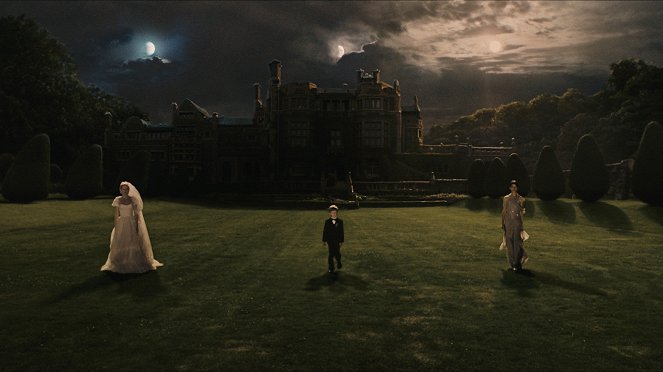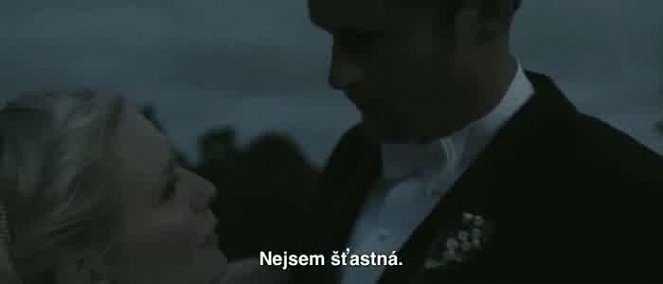Directed by:
Lars von TrierScreenplay:
Lars von TrierCinematography:
Manuel Alberto ClaroCast:
Kirsten Dunst, Charlotte Gainsbourg, Kiefer Sutherland, Charlotte Rampling, Udo Kier, Alexander Skarsgård, Stellan Skarsgård, John Hurt, Jesper Christensen (more)VOD (3)
Plots(1)
Justine (Kirsten Dunst) and Michael (Alexander Skarsgård) are celebrating their marriage at a sumptuous party in the home of her sister (Charlotte Gainsbourg) and brother-in-law (Kiefer Sutherland). Meanwhile, the planet, Melancholia, is heading towards Earth... Melancholia is a psychological disaster movie from director Lars von Trier. (Magnolia Pictures)
(more)Videos (2)
Reviews (11)
It's not nearly as layered and symbolically connected and confusing as Antichrist. Actually, it's pretty unbalanced. The first part (Justine) is a classic raw probe into the "ceremony", in which, under the pleasing façade of luxury, hides the mud of pathological relationships and the utter emptiness of modern times (the scene in which the heroine frenetically changes the opened reproductions of modernist paintings behind the canvases of Breughel and Caravaggio, the episode with the advertising agency and the ideal slogan). The inspiration for Vinterberg and Lars' roots in Dogma 95 is more than obvious here. The whole thing is drawn to the unforeseen treacherous and dark Kirsten Dunst, who seems to be an earthly reflection of the approaching planet Melancholia - attractive, destructive, unpredictable. The second part, named after Justine's "settled" sister Claire, is a strangely monotonous wait for disaster, with Trier shifting perspective somewhat from the inside of the characters to the sky from which doom approaches. Some of the dialogues, even with hindsight, feel stretched and a little empty, but the overall vibration is powerful, with the ending being the most powerful. The strange static and passivity of the characters is actually exciting when compared to the obsessive "worldly fixers" of American movies. Justine's condemnation hovers over Melancholia like a memento: Life on Earth is evil. There's no point in looking for philosophy and message in that. Trier focused on the characters and the massively gradating wave of feeling that flounders between heaven and earth, laughter and sadness, love and hatred. Melancholia really left me with a deep melancholy. There's no point in asking why. Melancholy doesn't have a clear origin. It's like the planet. It just emerges behind the sun one day and then crashes mercilessly. It doesn't really matter how many rational complaints you can make about von Trier's new film. It is above all a pure and beautiful fetish. If you're from the same blue-green planet as Lars, of course.
()
They should have cast Bruce Willis instead of Sutherland; only with that savior of our plant “asteroid my ass" would Trier throw an ironic grin at the audience; Jack Bauer is just too little time for something of that caliber. But seriously, now... A surreal “music video" of Wagner, Forman-style wedding and Trier in an intimate, emotional, but still visually most powerful ever end of the world. Several parts of it really manage to get across that specific atmosphere and the feelings typical for states of melancholy which you see/experience very rarely in movies.
()
Melancholia was my first film of Lars von Trier's and I can already say with certainty that it won't be my last (on my viewing side). At the beginning, it looks like some kind of avant-garde film, with a succession of highly expressive scenes that may or may not be related. Then there's a wedding with all that entails, but it doesn't go as planned, and to make matters worse, the planet Melancholia is moving towards (away from) Earth, as if deciding whether or not to crash into the blue planet. As far as the cinematography, the production design and indeed the overall visuals are concerned, it's a really good show. The performances by Kirsten Dunst (again in a troubled girl role) and Charlotte Gainsbourg are amazing and breathtaking, which, along with the perfect musical score, add to the overall stifling atmosphere. In short, a film that is definitely not for everyone (even I had to keep my distance at times), but I have to say it is worth seeing on the big screen.
()
The first, not very exciting (worthy of three-stars) half is excellently acted, with a nice variety of international stars in supporting roles. However, it doesn’t bring anything more to the table than any conversation scene from any of Trier’s (or Ozon’s) other films. The second (four-stars), more oppressive, more impressive, visually beautiful half of the film, which is also more interesting in terms of the script, intensifies the experience, resulting in the audience being dazzled by the artistic audiovisuals but perplexed and unfulfilled by the content. It’s as if Trier was just experimenting, trying to materialize a feeling, an idea from a short verse. For some, it may be an interesting and clever meditation (after all, it is an extremely elegant game with pictures, music and characters), but for me Melancholia remains only a handful of positive impressions rapidly fading away after the end credits.
()
It’s impossible to prepare oneself for Melancholia and the end of the world. Von Trier manages to capture that mood when there’s nothing you can do with a similar sense of urgency as Bergman. But he angers more people and additionally has Earth destroyed. Melancholia is a logical follow-up to Antichrist, which involved a clash between a man and a woman. This time, the clash is between two sisters, two approaches to life and ultimately two planets. The depressive Justine passively accepts her fate. She knows that she can’t change anything. At the same time, she represents extreme individualism. She would rather stay at home alone than submit to social conventions. Claire cares more about others. She doesn’t resign herself to the situation, but she wants to have it under control. Only at the end they switch roles and one finds understanding for the other. In its own way, it is a happy ending that, at the same time, shows how we spend our whole lives running away from the thought of death into magical caves, which can take different forms for everyone, but in the end they are of little help. Melancholia is also a biting polemic on American disaster movies, which conversely try to convince us that tragedy can be averted with human action and ingenuity (and Bruce Willis). Instead of a saviour, von Trier only offers two possible ways to accept the inevitable. On top of that, he forces us to spend the last hour before the end of the world with decadent representatives of high society who are definitely not bearers of noble qualities and have enough problems of their own. He thus doesn’t offer many reasons to wish for the end not to come, which I find more honest than the Hollywood approach. 85%
()
Gallery (49)
Photo © Nordisk Film Swe.



Ads